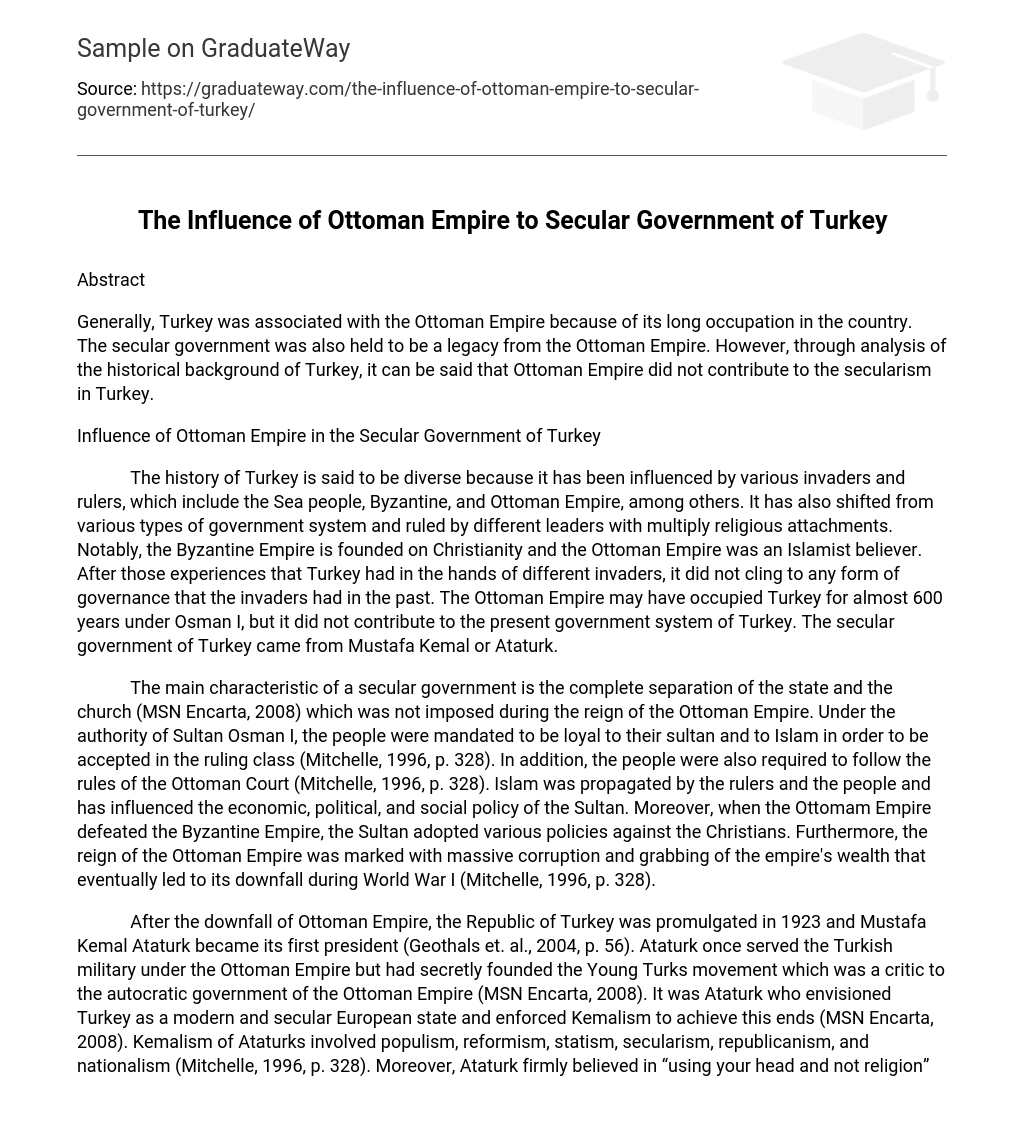Abstract
Generally, Turkey was associated with the Ottoman Empire because of its long occupation in the country. The secular government was also held to be a legacy from the Ottoman Empire. However, through analysis of the historical background of Turkey, it can be said that Ottoman Empire did not contribute to the secularism in Turkey.
Influence of Ottoman Empire in the Secular Government of Turkey
The history of Turkey is said to be diverse because it has been influenced by various invaders and rulers, which include the Sea people, Byzantine, and Ottoman Empire, among others. It has also shifted from various types of government system and ruled by different leaders with multiply religious attachments. Notably, the Byzantine Empire is founded on Christianity and the Ottoman Empire was an Islamist believer. After those experiences that Turkey had in the hands of different invaders, it did not cling to any form of governance that the invaders had in the past. The Ottoman Empire may have occupied Turkey for almost 600 years under Osman I, but it did not contribute to the present government system of Turkey. The secular government of Turkey came from Mustafa Kemal or Ataturk.
The main characteristic of a secular government is the complete separation of the state and the church (MSN Encarta, 2008) which was not imposed during the reign of the Ottoman Empire. Under the authority of Sultan Osman I, the people were mandated to be loyal to their sultan and to Islam in order to be accepted in the ruling class (Mitchelle, 1996, p. 328). In addition, the people were also required to follow the rules of the Ottoman Court (Mitchelle, 1996, p. 328). Islam was propagated by the rulers and the people and has influenced the economic, political, and social policy of the Sultan. Moreover, when the Ottomam Empire defeated the Byzantine Empire, the Sultan adopted various policies against the Christians. Furthermore, the reign of the Ottoman Empire was marked with massive corruption and grabbing of the empire’s wealth that eventually led to its downfall during World War I (Mitchelle, 1996, p. 328).
After the downfall of Ottoman Empire, the Republic of Turkey was promulgated in 1923 and Mustafa Kemal Ataturk became its first president (Geothals et. al., 2004, p. 56). Ataturk once served the Turkish military under the Ottoman Empire but had secretly founded the Young Turks movement which was a critic to the autocratic government of the Ottoman Empire (MSN Encarta, 2008). It was Ataturk who envisioned Turkey as a modern and secular European state and enforced Kemalism to achieve this ends (MSN Encarta, 2008). Kemalism of Ataturks involved populism, reformism, statism, secularism, republicanism, and nationalism (Mitchelle, 1996, p. 328). Moreover, Ataturk firmly believed in “using your head and not religion” as a guide for the future of Turkey which is different with the belief of the Ottoman (Geothals et. al., 2004, p. 56). The secularism or the separation of religion and politics was emphasized by Ataturks which is evident in the present system of Turkey. As a result, political parties were not allowed to advance any causes that will benefit or affect any religious practice or belief. Being a democratic country, the people are allowed to exercise their faith freely but cannot encroach on the policy making of the government.
Furthermore, under the leadership of Ataturk and in line with Kemalism, he introduced many reforms by adopting Western behaviors. Upon assuming office, Ataturk abolished the sultanate and deported the remaining Ottoman family (Geothals et. al., 2004, p. 56). He also replaced the religious education system with a uniform civil education and closed the Shari’a or the Slamic court (Geothals et. al., 2004, p. 56). There was only one political party system. Moreover, the Islamic calendar was changed and the country adopted the internaltional calendar as well as the Western civil, penal and commerce codes (Geothals et. al., 2004, p. 56).
Democracy was felt over the land when education was opened to both men and women. Eventually, the archaic Arabic script was change by the adoptation of the Turkish alphabet which is similar with that of Latin (Geothals et. al., 2004, p. 56). Remarkably, women were also allowed to vote in the parliamentary elections (Geothals et. al., 2004, p. 56). Furthermore, a law was enacted requiring the names of all Turks to bear the surname “Ataturk” which means father of Turks (Geothals et. al., 2004, p. 56). All these changes which are evident in the present Turkey were influences of Ataturk and not directly by the Ottoman Empire.
It can also be observed that Ataturk was loved and was idolized by the Turks because his portraits can be seen in the walls of public institutions, restaurants, coffee shop, and in any other public places. His secularism was rooted to the people of Turkey as observed in the 2007 presidential election. According to BBC News, when Abdullah Gul ran for president, thousands of protesters rallied in support for the secularism. The protesters criticized Mr. Gul because of his loyalty to Islam that poses a threat to the fundamental secularism.
Based on the historical background of Turkey, it can be deduced that the Ottoman Empire did contribute much on the formation of its secular government. It was Ataturk who formed the ideas and independently established it in Turkey.
References
BBC News. (2008). HugeRally for Turkish Secularism. Retrieved May 29, 2008, from http://news.bbc.co.uk/2/hi/europe/6604643.stm
Geothals, G. R., Sorenson, G. J., & Burns, J.M. (2004). Encyclopedia of Leadership. New York: Sage.
Mitchelle, B. M., & Salsbury, R. E. (1996). Multicultural Education: An International Guide to Reaserch, Policies and Programs. London: Greenwood Press.
MSN Encarta. (2008). Turkey. Retrieved May 29, 2008, from http://encarta.msn.com/encyclopedia_761575380/Turkey.html#s1





